#High-Protein Whole Grains
Text
What are the best high-protein whole grains?
Are you curious about the best high-protein whole grains for a healthy diet? This is one of the most common questions I am asked as a registered dietitian nutritionist (RDN). Why the interest? It’s simple. Whole grains are not just energy sources; they’re nutrient powerhouses.
Whole grains are a great source of protein, fiber, and other essential nutrients. They are an important part of a…

View On WordPress
0 notes
Text
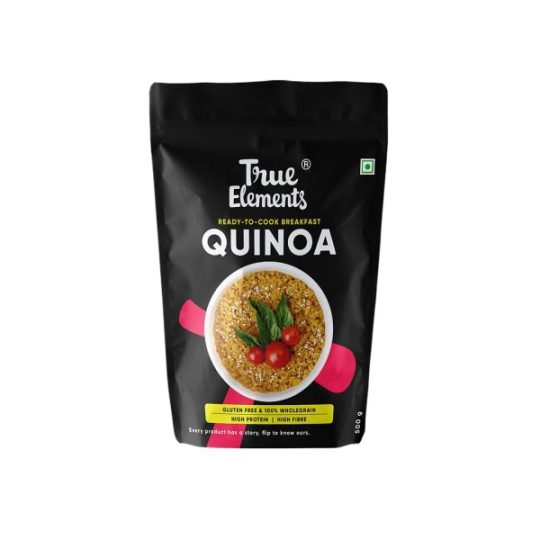
True Elements Quinoa 500 gm
True Elements Quinoa is composed of vitamins, minerals, and nutrients required by the body to carry out its functions. That provides all the essential amounts of nutrients required. It helps boost immune function.
https://www.cureka.com/shop/nutrition/weight-loss-foods/quinoa/true-elements-quinoa-500-gm/
#Quinoa#Superfood#Whole Grain#Protein Source#Gluten-Free#Vegan#Nutrient-Dense#Healthy Eating#Balanced Diet#Plant-Based Protein#Versatile Ingredient#High Fiber#Antioxidants#Essential Nutrients#Iron-Rich#Calcium Source#Omega-3 Fatty Acids#Cooking Ingredient#Ancient Grain#Sustainably Sourced
0 notes
Text
#Looking to shed some pounds and get in shape? Here are some of the best foods to eat for weight loss:#Leafy Greens: Leafy greens like spinach#kale#and collard greens are low in calories and high in fiber#which can help keep you feeling full.#Lean Protein: Foods like chicken#fish#and tofu are great sources of lean protein#which can help you build muscle and burn more calories.#Whole Grains: Whole grains like quinoa#brown rice#and whole wheat bread are high in fiber and can help keep you feeling full and satisfied.#Fruits and Vegetables: Fruits and vegetables are packed with nutrients and fiber#and can help you stay full and satisfied throughout the day.#Nuts and Seeds: Nuts and seeds are high in protein and healthy fats#which can help keep you feeling full and satisfied.#To maximize your weight loss#be sure to combine these foods with regular exercise and a healthy lifestyle. And don't forget to use these viral hashtags to share your jo#weightlossjourney#healthyeating#fitfood#nutrition#eatclean#fitnessmotivation.#fat loss
0 notes
Text
Prediabetes Diet Plans Everybody Should Follow
People with prediabetes have higher blood sugar than normal, however not high enough yet for a diabetes diagnosis. Prediabetes may cause a high risk of type 2 diabetes, coronary heart disease, and stroke.
Being overweight is a main primary risk factor for prediabetes. The extra fatty tissue you have, specifically the interior and between the muscle, pores, and skin around your abdomen, the more resistant your cells become to insulin. Eating healthy foods and by following prediabetes diet plans, making a bodily recreation section of your day-by-day routine, and staying at a wholesome weight can assist carry your blood sugar stage again to normal.
The identical lifestyle adjustments that can assist stop type 2 diabetes in adults might also help bring children's blood sugar levels back to normal.
Click here
#best diet for prediabetes and high blood pressure#health benefits#protein diet for prediabetes#fruits for prediabetes#whole grain for prediabetes#best nuts for prediabetes#foods to avoid if you are prediabetes#diabetes diet#high protein veg food for prediabetes.#Keto diet for diabetes and high blood pressure#low-carb high-fat diet for diabetes#ketogenic diet diabetes type 2#best foods for diabetes control#prediabetes diet plan vegetarian
0 notes
Text
Ways to rejuvenate spiritual & physical energy levels
Here are some herbs, plants, teas, foods, and recipes that will help rejuvenate energy:
Ginseng: This is a traditional Chinese herb that has been used for centuries to increase energy levels, reduce stress and fatigue.
Matcha Tea: This tea is a form of green tea that is high in antioxidants and caffeine, which can help improve mental alertness and physical energy.
Maca Root: This herb has been traditionally used in Peru to enhance stamina, endurance and energy levels.
Ashwagandha: This adaptogenic herb is used in Ayurvedic medicine to reduce stress, anxiety, and fatigue.
Chia Seeds: These tiny seeds are packed with nutrients and can help provide a slow release of energy throughout the day.
Dark Chocolate: This treat is high in flavonoids which can help improve mental alertness and focus.
Spinach: This leafy green vegetable is high in iron, which is essential for maintaining energy levels.
Quinoa: This grain is rich in protein and complex carbohydrates, which can provide sustained energy.
Lemon & Ginger Tea: This tea is a great way to boost your immune system, reduce inflammation, and increase energy levels.
Berry Smoothie: Blend together a handful of mixed berries, a banana, a tablespoon of honey, and some almond milk for a delicious and energizing smoothie.
Avocado Toast: Mash half an avocado and spread it onto a slice of whole-grain bread for a healthy and energizing breakfast.
Grilled Chicken Salad: Toss together some grilled chicken, mixed greens, cherry tomatoes, cucumber, and a lemon vinaigrette for a light and energizing lunch.
Sweet Potato & Lentil Curry: This hearty and delicious dish is packed with nutrients and is a great source of sustained energy.
Baked Salmon: This fish is high in omega-3 fatty acids which can help improve mental focus and reduce fatigue.
Golden Milk: This warm and soothing drink is made with turmeric, ginger, honey, and coconut milk, and is believed to help reduce inflammation and increase energy levels.
#spiritual ways to increase energy levels#physical ways to increase energy#kitchen witch#kitchen witchcraft#witchblr#witchcore#witchcraft#witchlife#white witch#beginner witch#witch tips#grimoire#herb magick#green witch#spirituality#book of shadows
4K notes
·
View notes
Text
HOW TO GLOW UP IN SUMMER !



Glowing up in the summer can be a fun and exciting journey to enhance your beauty, confidence, and overall well-being.
By: ★﹕stᥲrgιrᥣ﹒
strategies for girls to glow up during the summer:
1.Skin care routine: Start by establishing a consistent skincare routine that works for your skin type. Focus on cleansing, exfoliating, moisturizing, and using sunscreen to protect your skin from the sun's harmful rays. Consider adding serums, face masks, and eye creams to target specific skin concerns.
2.Stay hydrated: Hydration is key to achieving a healthy glow. Drink plenty of water throughout the day to keep your skin hydrated and radiant. You can also incorporate hydrating foods like fruits, vegetables, and herbal teas into your diet to nourish your skin from the inside out.
3.Healthy diet: Fuel your body with nutritious foods that support your skin health and overall well-being. Incorporate fruits, vegetables, lean proteins, and whole grains into your meals to provide your body with essential nutrients and antioxidants.
4.Exercise regularly: Stay active during the summer by engaging in physical activities that you enjoy. Whether it's going for a run, practicing yoga, dancing, or swimming, regular exercise can improve your mood, boost your energy levels, and enhance your overall glow.5.
5.Sun protection: Protect your skin from sun damage by wearing sunscreen with a high SPF, seeking shade during peak hours, and wearing protective clothing like hats and sunglasses. Sun protection is essential for maintaining healthy and youthful-looking skin.
6.Hair care: Take care of your hair by using hydrating shampoos and conditioners, minimizing heat styling, and getting regular trims to prevent split ends. Consider trying out hair masks to keep your hair looking healthy and vibrant.
7.Self-care: Prioritize self-care activities that help you relax, unwind, and de-stress. Whether it's practicing meditation, taking long baths, getting a massage, or pampering yourself with skincare products, self-care can enhance your inner glow and confidence.
8.Dress for confidence: Wear clothes that make you feel confident, comfortable, and stylish. Experiment with different styles, colors, and accessories to express your personality and enhance your self-confidence.u don't need to buy from expansive brand
9.Positive mindset: Cultivate a positive mindset by practicing gratitude, affirmations, and self-love. Embrace your uniqueness, celebrate your strengths, and focus on the things that make you happy and fulfilled.
#becoming that girl#glow up#wonyoungism#wonyoung#dream life#it girl#creator of my reality#divine feminine#it girl affirmations#love affirmations#glowingskin#summer#love yourself#confidence#self care
1K notes
·
View notes
Text
Femme Fatale Guide: Healthy Habits To Look & Feel Your Best Without Restriction or Unrealistic Routines
Realistic ways to maintain a healthy life/body/appearance (size and weight are all personal, not the most important metric – for certain). No diet culture or delulu-land tips here.
What I've done to maintain my 30-pound weight loss for over a decade, glowing clear skin (no pimples or discoloration, etc.), and super healthy, full & shiny hair, still living life and enjoying it – the mindful way.
Eat home-cooked meals & (plant-based) whole foods – 90-95% of the time
Incorporate at least 1 salad into my daily routine (either a large, hearty lunch salad or a simple green salad as a starter with dinner)
Include at least 1 fruit/vegetable in every meal or snack
Never restrict food groups – whole grains/potatoes, healthy fats, protein-rich plant foods, and produce are all essential to consume every day
Focus on meals, but have whole food snack options on hand to enjoy if genuinely hungry (mainly fruit, lupini beans, edamame, carrots/celery/cucumber with hummus, plain popcorn, handful of almonds/cashews)
Have breakfast after one coffee (before a second) and have dinner late enough (8-9:30 pm) to curb late-night hunger
Only have fruit and tea after dinner; Always stop consuming food at least 3 hours before bed for better sleep/digestion
Order whatever I want when going out to eat, but split dessert
Have at least one indulgent meal/dessert per week
No sugary cocktails – wine, champagne/prosecco, martinis, gin & tonic, margarita, French Connection, Sambuca, Grappa, tequila on the rocks, etc. are great options. Bellinis/fruit plus wine/spirits cocktails are a good middle ground. Sugary drinks worsen the hangover – big-time
Perceive healthy eating as a form of enjoyment, creativity, and nourishment, not restriction or deprivation (it's not if done liberally enough)
Consume a vitamin B12 and vitamin D supplement daily. Keep digestive enzymes on hand for when they're necessary
Always have a large glass of water first thing in the morning (before coffee) and by my side all day long
No soda, juices, sugary drinks, etc. Black coffee, tea, and water only on the daily – wine and no-sugar alcoholic drinks on rare occasions. Smoothies can be a great snack or breakfast, though!
Incorporate an (almost) daily walk into my schedule as a form of exercise and a mental health reset (I aim for 4-5 miles/10Kish steps per day on average)
Do short, low-impact strengthen training exercises 3x a week (15-30 mins each usually) for bone health & toning
Never forcing myself to do strenuous exercise/workout formally in a gym – it's not for me; it doesn't make me feel/look better and throws my hunger & energy levels way off. To each their own, though
Have a variety of playlists ready to go for waking up, working, dancing, walking/workouts, doing chores, and reading/relaxing
Internalizing that sexual health is a core aspect of your health & well-being – on all counts
Maintaining a simple skincare routine 2x per week with high-quality products and a couple of weekly treatments
Prioritizing my body care routine with as much as my facial skincare routine
Wearing at least SPF 30 daily
Exfoliating 2-3x per week
Learning what hair products work for my hair type; Using a deep conditioning mask and a scalp mask weekly
Using only cold water when washing my hair
Incorporating face & body massages into my weekly at-home routine
Using Uriage lip balm, hand cream, and deodorant religiously
Flossing 1-2 times a day/using an electric toothbrush
#healthy habits#healthy eating#health and wellness#health & fitness#health is wealth#skincare tips#haircare#self care#glow up era#self concept#femme fatale#dark feminine energy#dark femininity#it girl#high value woman#the feminine urge#high value mindset#female excellence#female power#queen energy#dream girl#femmefatalevibe#q/a
2K notes
·
View notes
Text
Superfoods you should incorporate in your diet:
Superfoods are nutrient-dense foods that are considered beneficial for your health due to their high concentration of vitamins, minerals, antioxidants, and other beneficial compounds.
Combine these superfoods with a variety of other whole foods to ensure you're getting a wide range of nutrients. Also, be mindful of portion sizes and any individual dietary restrictions or allergies you may have.
Berries: Blueberries, strawberries, raspberries, and other berries are rich in antioxidants, fiber, and vitamins.
Leafy greens: Spinach, kale, Swiss chard, and other leafy greens are packed with vitamins, minerals, and fiber. They are low in calories and provide important nutrients like vitamin K, vitamin C, and folate.
Cruciferous vegetables: Broccoli, cauliflower, Brussels sprouts, and cabbage are part of the cruciferous vegetable family. They contain compounds that may help reduce the risk of certain cancers.
Nuts and seeds: Almonds, walnuts, chia seeds, flaxseeds, and hemp seeds are excellent sources of healthy fats, protein, fiber, and various vitamins and minerals.
Fish: Fatty fish like salmon, sardines, and mackerel are rich in omega-3 fatty acids, which are beneficial for heart health and brain function.
Whole grains: Quinoa, brown rice, oats, and whole wheat are examples of whole grains that provide fiber, vitamins, and minerals.
Legumes: Beans, lentils, chickpeas, and other legumes are high in fiber, protein, and various nutrients. They are also a good source of plant-based protein.
Turmeric: This spice contains curcumin, a compound with potent anti-inflammatory and antioxidant properties.
Green tea: Green tea is rich in antioxidants called catechins and is believed to have various health benefits, including improved brain function and a lower risk of certain diseases.
Dark chocolate: Dark chocolate with a high cocoa content (70% or higher) is a source of antioxidants and may have positive effects on heart health and mood.
Avocado: Avocados are rich in healthy fats, fiber, and various vitamins and minerals. They also provide a good source of potassium.
Greek yogurt: Greek yogurt is a protein-rich food that also contains beneficial probiotics, calcium, and vitamin B12.
Sweet potatoes: Sweet potatoes are packed with vitamins, minerals, and fiber. They are an excellent source of beta-carotene, which is converted into vitamin A in the body.
Garlic: Garlic contains sulfur compounds that have been associated with potential health benefits, including immune support and cardiovascular health.
Ginger: Ginger has anti-inflammatory properties and is commonly used to aid digestion and relieve nausea.
Seaweed: Seaweed, such as nori, kelp, and spirulina, is a rich source of minerals like iodine, as well as antioxidants and omega-3 fatty acids.
Pomegranate: Pomegranates are packed with antioxidants and are believed to have anti-inflammatory properties. They are also a good source of vitamin C and fiber.
Cacao: Raw cacao is the purest form of chocolate and is rich in antioxidants, flavonoids, and minerals. It can be enjoyed as nibs, powder, or in dark chocolate form.
Quinoa: Quinoa is a gluten-free grain that provides a complete source of protein, along with fiber, vitamins, and minerals.
Extra virgin olive oil: Olive oil is a healthy fat option, particularly extra virgin olive oil, which is high in monounsaturated fats and antioxidants.
Chia seeds: Chia seeds are a great source of fiber, omega-3 fatty acids, and antioxidants. They can be added to smoothies, yogurt, or used as an egg substitute in recipes.
Beets: Beets are rich in antioxidants and are known for their vibrant color. They also contain nitrates, which have been shown to have beneficial effects on blood pressure and exercise performance.
Matcha: Matcha is a powdered form of green tea and is known for its high concentration of antioxidants. It provides a calm energy boost and can be enjoyed as a tea or added to smoothies and baked goods.
Algae: Algae, such as spirulina and chlorella, are nutrient-dense foods that are rich in protein, vitamins, minerals, and antioxidants. They are often consumed in powdered or supplement form.
Fermented foods: Fermented foods like sauerkraut, kimchi, kefir, and kombucha are rich in beneficial probiotics that support gut health and digestion.
Maca: Maca is a root vegetable native to the Andes and is often consumed in powdered form. It is known for its potential hormone-balancing properties and is commonly used as an adaptogen.
Goji berries: Goji berries are small red berries that are rich in antioxidants, vitamins, and minerals. They can be enjoyed as a snack or added to smoothies and oatmeal.
Hemp seeds: Hemp seeds are a great source of plant-based protein, healthy fats, and minerals like magnesium and iron. They can be sprinkled on salads, yogurt, or blended into smoothies.
Moringa: Moringa is a nutrient-dense plant that is rich in vitamins, minerals, and antioxidants. It is often consumed as a powder or used in tea.
Mushrooms: Certain mushrooms, such as shiitake, reishi, and maitake, have immune-boosting properties and are rich in antioxidants. They can be cooked and added to various dishes.
#health tips#healthy lifestyle#health and wellness#nutrients#healthy life tips#healthy life hacks#healthy diet#level up journey#high value mindset#health is wealth#levelupjourney#glow up tips#glow up#nutrition#healthy living
2K notes
·
View notes
Text
Healthy - Platin
Introduction to healthy snacks and their importance in a balanced diet Healthy snacks play a crucial role in maintaining a balanced diet and promoting overall health. These snacks are typically nutrient-dense and provide essential vitamins, minerals, and antioxidants that support optimal bodily functions. They are also low in added sugars, unhealthy fats, and artificial ingredients, making them a healthier alternative to processed snacks. By incorporating healthy snacks into our daily diet, we can ensure that our bodies receive the necessary nutrients to thrive. Benefits of including healthy snacks in daily diet Including healthy snacks in our daily diet offers numerous benefits. Firstly, they provide a steady source of energy throughout the day, preventing dips in blood sugar levels and helping to maintain focus and productivity. Additionally, healthy snacks can improve nutrient intake, as they often contain essential vitamins, minerals, and fiber that may be lacking in other meals. Snacking on nutritious foods can also help curb cravings for unhealthy options, reducing the likelihood of overeating or making poor food choices. Role of healthy snacks in weight management and overall health Healthy snacks can play a significant role in weight management and overall health. When chosen wisely, they can help control hunger and prevent overeating during main meals. Snacks that are high in fiber and protein can increase feelings of fullness and promote satiety, reducing the desire to consume excessive calories. Additionally, incorporating healthy snacks into a balanced diet can support weight loss efforts by providing essential nutrients while keeping calorie intake in check. Moreover, healthy snacks are often associated with the Mediterranean diet, keto diet which has been widely recognized for its numerous health benefits. This diet emphasizes fruits, vegetables, whole grains, lean proteins, and healthy fats, such as those found in nuts and seeds. Studies have shown that following a Mediterranean diet can help prevent heart disease, improve brain health, and reduce the risk of chronic diseases. By choosing healthy snacks that align with the principles of the Mediterranean diet, individuals can further enhance their overall health and well-being.
1K notes
·
View notes
Text
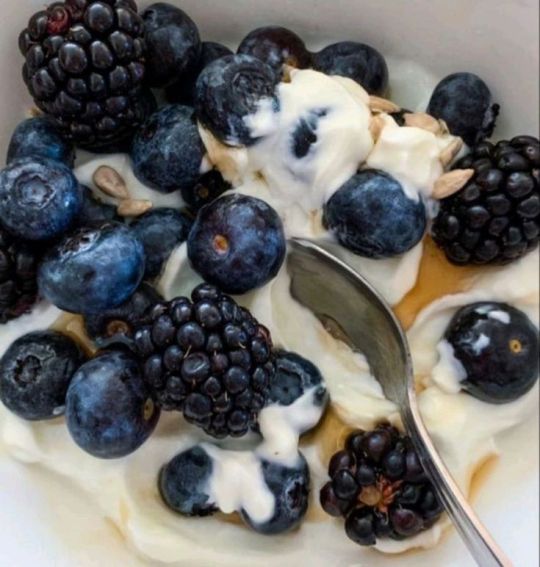
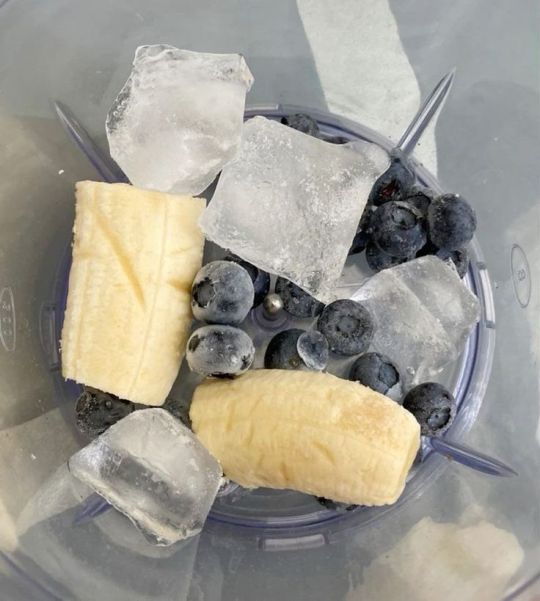
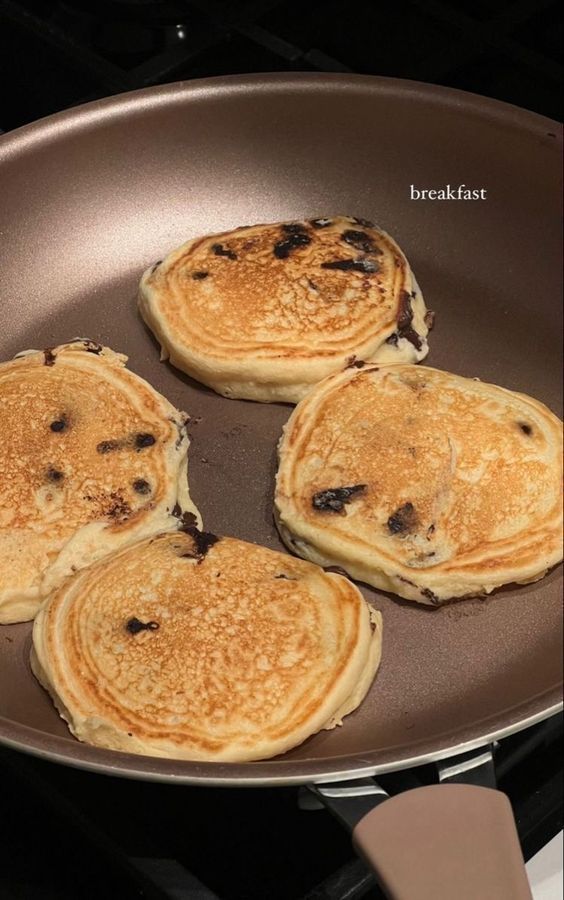
the effect of what (and how) you eat
okay, this is a big topic. and so this is a long post. i'm going to be going over the effect of what you eat and why it's important to think about what foods you are consuming. don't worry! i do my research-- at the end of the post will be a few resources, and i'll show where i've gotten my information.
lots of dietary advice is available over the internet, but often the people absorbing the information do not understand the why. knowing where your information is coming from,, and not believing everything you read online is key to actually maintaining a good, healthy diet.
before you read: TRIGGER WARNING THERE IS MENTION OF EATING DISORDERS,,
let's start with this: like everything in this age, food is a double-edged sword. overconsumption and underconsumption can both kill you. what you eat; how you eat--it can help or hinder whatever your goals may be.
here's the effect/s: the connection between diet and mental health is profound. while we’ve long understood that diet plays a crucial role in overall health, emerging research in the field of nutritional psychiatry sheds light on how what we eat directly impacts our emotional well-being and mental state.
the brain-gut connection: the gut is closely linked to the brain. trillions of living microbes in our gut have essential functions, including synthesizing neurotransmitters. these neurotransmitters send chemical messages to the brain, regulating sleep, pain, appetite, mood, and emotions.
to improve your gut health, here's what you can do:
by eating a varied diet that includes fruits, vegetables, whole grains, nuts and seeds, essential nutrients are provided which feeds the beneficial bacteria in the gut. high fibre foods promote gut health by supporting good bacteria.
fermented foods, such as yogurt, kefir, sauerkraut, kimchi, and miso are rich in probiotics—live beneficial bacteria that boost gut health. kombucha (a fermented tea) is another option.
avoiding reducing processed foods can reduce the diversity of good bacteria in your gut. when i say processed foods, i'm referring to ultra-processed foods, for example, fried foods and frozen meals. they may be easy and cheap, but they include preservatives, artificial colouring, chemical flavouring and texturing agents. all of which our bodies are not made to consume.
it's ignorant to tell you to avoid processed foods at all costs. that's not realistic, and a horrible mindset. instead, you should manage your intake. enjoy treats every now and then and don't punish yourself for it.
hydration is key to a healthy gut. water supports digestion and nutrient absorption.
stress management, eating well and exercise can also help your gut microbiome's health.
by having a healthy gut microbiome, you are helping your body to have lower chronic inflammation, have regular bowel movements and more effectively absorb nutrients. therefore, you will have a stronger immune system, have clearer skin and support your digestion and metabolism.
why eating protein matters: proteins are made of amino acids, which serve as the fundamental building blocks for various structures in our bodies. these amino acids are essential for forming enzymes, hormones, tissues, and DNA. protein is vital in maintaining and building muscle mass. when activities like strength training and physical exercise are engaged in, protein helps build and repair the muscles.
hemoglobin, a protein in our red blood cells, transports oxygen from our lungs to other tissues. without adequate protein, oxygen delivery would be compromised. antibodies, which defend against infections, are made of proteins. a well-functioning immune system relies on sufficient protein intake. collagen, a protein, maintains the integrity of our skin, hair, and nails. adequate protein supports healthy skin elasticity and wound healing.
the recommended dietary intake for protein relies on factors such as age, weight, height, gender, activity and overall health. remember that individual needs can vary, so consulting with a healthcare provider or registered dietitian is advisable to determine your specific protein requirements.
many diets exist that cut out entire macronutrients (keto for example) but that is not the way. each macronutrient has great importance in helping the body function.
carbohydrates are the body's (including the brain) preferred energy source. they enable muscle contraction during exercise and even at rest. carbs maintain body temperature, support heart function, and aid digestion.
the keto diet comes from the belief that when carbohydrates are not providing energy (are not being consumed), the body will use reserved energy stored in lipids (fat). while this is true, this diet is not maintainable-- it throws the body out of whack, storing more energy to maintain homeostasis.
fats provide energy and are essential for hormone production. they contribute to cell growth, brain health and vitamin absorption.
our brain is composed of ~60% fat. fats are essential for neurotransmitter production, affecting mood, cognition, and hormonal signalling. cholesterol, often associated with heart health, is a precursor for steroid hormones (testosterone, estrogen, progesterone). without adequate cholesterol, our body cannot produce these essential hormones.
effects of diet on mood: firstly, going long periods without eating can cause a drop in blood sugar levels, leading to tiredness and irritability. secondly, consuming excessive amounts of food can make you feel tired and lethargic.
choosing the right carbohydrates can help maintain blood sugar levels. our brain primarily runs on glucose (obtained from carbohydrate-rich foods). you can opt for slow-release carbohydrates to maintain steady energy levels. slow-release carbohydrates (a.k.a low GI food) provide a more sustained and gradual release of energy compared to other carbohydrates. examples include fruits, vegetables, whole grains (grainy bread, brown rice, oats) and sweet potatoes. high GI foods rapidly spike blood sugar levels due to their quick digestion and absorption.
going too long without eating can lead to low blood sugar levels, resulting in irritability and fatigue. overeating to discomfort can also leave you feeling tired and lethargic. consistent, moderate-sized meals help maintain stable blood sugar levels and promote an even mood.
i know, overeating is an issue that one cannot simply 'turn off'. it's important to know the psychology, and if you struggle with it--please talk to a health professional.
here is what i can tell you about overeating:
overeating is typically a learned behaviour and habit. certain foods are associated with pleasure and reward. when enticing food is encountered, we engage in eating behaviour and immediately experience pleasure. this reinforces the habit, making it challenging to change.
overeating may be serving as a coping mechanism for emotions. when feelings of sadness, disappointment, frustration, or even joy arise, someone may turn to food. emotional eating provides temporary relief, reinforcing the behaviour.
the first delicious bite triggers pleasure, satiates our appetite, and improves our emotional state. our memory associates this reward process with eating, leading us to continually seek that pleasure. this is due to immediate reward.
people with eating disorders may disregard their health, body, body image and lifestyle goals. they use food as a way to punish themselves and gain control over their life. restrictive eating disorders can lead to 'binging behaviour'. bingeing serves as a way to numb emotions. anxiety, stress, and depression can trigger binge behaviours. consuming certain foods or substances (like junk food or alcohol) releases dopamine, the “feel-good” neurotransmitter. this chemical rush can lead to physical addiction, reinforcing bingeing. a culture (unfortunately which is abundant in the world today) that emphasizes consumption as a measure of worth can contribute to bingeing. messages about thinness, drinking, and material possessions can drive these behaviours.
i hate that i am having to say this but alcoholism is bad. and caffeine addiction is bad. in no way is harming your health aesthetic or 'a vibe'.
limiting caffeine and alcohol can also improve mood. again, i'd like to stress that there is never going to be one perfect diet, and allowing yourself to enjoy whatever food you like is perfectly fine- as long as you are doing so in moderation.
everything is a balance.
resources/further reading, to end:
Fat Requirements For Optimal Hormonal Health - Clean HealthHow Dietary Fat Benefits Hormones - Women's International Pharmacy (womensinternational.com)
The truth about fats: the good, the bad, and the in-between - Harvard HealthDietary fats | healthdirectMacronutrients: Definition, importance, and food sources (medicalnewstoday.com)Know Your Macros-Why Macronutrients Are Key to Healthy Eating | Cedars-SinaiWhy the Proper Balance of Macronutrients is Vital for Good Health - Functional Diagnostic Nutrition
What Is Protein & Why Do You Need It? (eatingwell.com)Protein: Why Your Body Needs It (webmd.com)Protein | The Nutrition Source | Harvard T.H. Chan School of Public HealthBinge-Eating Disorder (Compulsive Overeating) | Psychology Today AustraliaThe Psychology Behind Binge-Watching | PsychregBingeing: Why It Happens and What You Can Do About It (greatist.com)
Understanding Overeating: The Psychology Behind It - Listen-HardWhy stress causes people to overeat - Harvard HealthThe Truth About Overeating | Psychology TodaySlow-release carbs list (medicalnewstoday.com)Why understanding carbs (and how to count them) matters | Diabetes UK
Food and your mood - Better Health ChannelHow food can affect your mood | Nutrition AustraliaStress-related stomach pain: When to see a doctor - UChicago MedicineWhat Is Gut Health? A Comprehensive Guide to Digestive Wellness | U.S. News (usnews.com)Why Gut Health Matters More Than You Think | Well.Org
Probiotics: What They Are, Benefits & Side Effects (clevelandclinic.org)Probiotics: What You Need To Know | NCCIH (nih.gov)What should I eat for a healthy gut? - BBC FoodLet’s Eat: How Diet Influences the Brain (brainfacts.org)
i know the fact that the resources are one big block may be annoying, but i don't have the commitment to in text reference lmao. hours of research and writing for a blog post, yes, but in text referencing is just too far.
i hope you learnt something
❤️joanne
#elonomh#elonomhblog#student#student life#academia#chaotic academia#productivity#study blog#that girl#becoming that girl#sports science#anatomy#health science#health and wellness#healthy life#healthy lifestyle#wellness and health#mental health#health & fitness#healthylifestyle#health tips#wellness aesthetic#wellness girl#wellness moodboard#wellness#wellbeing#healthy living#vitamins
80 notes
·
View notes
Text
Ten Tips for an Easy Yom Kippur Fast
Fasting doesn’t necessarily mean suffering. There’s quite a bit we can do to alleviate the bodily and mental stress that normally accompanies a fast. The day before the fast, follow the following guidelines:
1. Cut down your caffeine intake to minimize headaches. That means stop drinking coffee, tea, and cola at least eight hours before the fast, and preferably twenty-four hours before the fast.
2. Avoid salty, spicey, and fried foods on the day before the fast.
3. Avoid white sugar, white flour, and white rice. Eat whole-grained foods such as brown rice and whole-wheat bread or challa.
4. Drink a lot of water all day long.
5. Eat a good breakfast that includes fruits, veggies, eggs or sardines, and whole grains.
6. The pre-Yom Kippur meal (se’uda mafseket) should include baked or broiled fish, a veggy salad, consomme, a small portion of chicken or turkey, and a side dish of complex carbohydrates. Substitute sweet deserts with watermelon or other water-retaining fresh fruit, and a cup of herb tea with a whole-grain cookie.
On Yom Kippur:
7. The more you immerse yourself in prayer, the less you’ll think about food.
8. Rest between prayers. Don’t run around outside, especially in the hot sun. Save your voice for prayers. Idle talking will make you thirstier, and will detract from the holiness of the day.
After the fast:
9. Drink two glasses of water, and then eat solids gradually, so as not to shock the digestive system. Begin with fruit, like plums or grapes. The worst thing people do is to consume pastries and soft drinks, or “lekach un bronfan” (cake and liquor) right after the fast (these are unhealthy anytime, all the more so right after the fast when they give your body a shock of glucose).
10. Forty-five minutes to an hour afterwards, one can eat a balanced meal with protein, carbohydrates, and vegetables. After eating, relax for an hour with your favorite book (preferably Gemara of the laws of Succoth from Shulchan Oruch) and your favorite beverage, then begin constructing your Succa.
Attention diabetics, heart patients, folks with high blood pressure, and people whose health depends on regular medication - you must be especially careful to ask your doctor if you are capable of fasting, and then consult with your local rabbi, giving him the doctor’s exact opinion. For many such people, it is a mitzva not to fast on Yom Kippur.
164 notes
·
View notes
Text
Which is the best foods for weight loss in united states ?
The best foods for weight loss in the United States combine nutritional value, portion control, and sustainable eating habits. Here are some attractive options:
Leafy Greens: Incorporate kale, spinach, and Swiss chard into your meals. They're low in calories but packed with essential vitamins, minerals, and fiber.
Lean Proteins: Opt for skinless poultry, lean cuts of beef or pork, tofu, and legumes. Protein helps you feel full and preserves muscle mass.
Fruits: Enjoy colorful fruits like berries, apples, and citrus. They're rich in antioxidants and fiber, making them satisfying and nutritious.
Whole Grains: Choose whole grains like quinoa, brown rice, and whole wheat bread. They're fiber-rich and provide lasting energy.
Nuts and Seeds: Almonds, walnuts, and chia seeds are excellent sources of healthy fats and protein. They also keep you feeling full longer.
Fish: Fatty fish like salmon and mackerel are high in omega-3 fatty acids, which support heart health and can aid in weight loss.
Greek Yogurt: It's protein-packed and can be a creamy, satisfying snack or breakfast option.
Vegetables: Broccoli, cauliflower, and Brussels sprouts are low in calories and high in fiber. They make great additions to meals.
Avocado: While calorie-dense, avocados provide healthy fats and fiber, helping control appetite.
Beans and Lentils: They're rich in protein and fiber, keeping you full and stabilizing blood sugar levels.
Water: Don't forget the importance of staying hydrated. Drinking water before meals can help control portion sizes.
Herbs and Spices: Flavor your dishes with herbs and spices instead of salt or high-calorie sauces.
Remember, the key to successful weight loss is not only about individual foods but also about overall dietary patterns and lifestyle choices. A balanced diet, portion control, regular physical activity, and consistency are essential for achieving and maintaining a healthy weight. Consult a healthcare professional or a registered dietitian for personalized guidance on your weight loss journey.
Read more helpful information about health & fitness :
#weightloss#lose weight#weight loss journey#i need to lose so much weight#nutrition#health and fitness#healthy lifestyle#healthy living#healthy eating#workout#exercise#healthy#healthy food#spiritual development#i wanna be weightless#i want to be weightless#i will be thinner#i love him#am#love
115 notes
·
View notes
Text
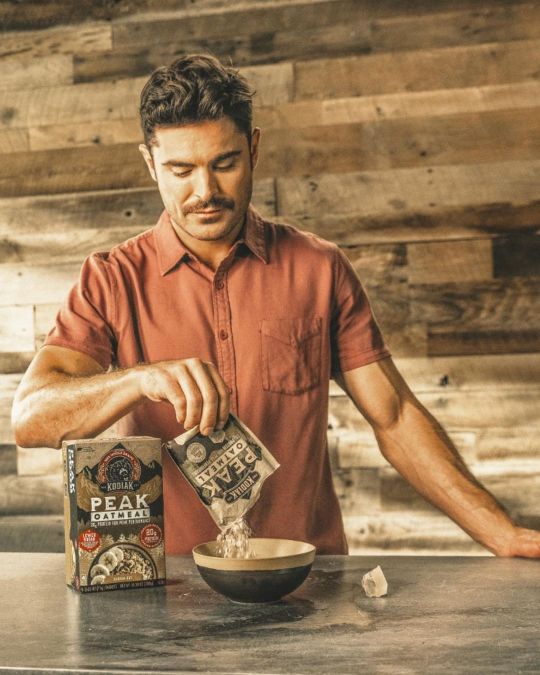
kodiakcakes: Oatober Kodiak-Hack: Full send into whole grain greatness with COOKIES FOR BREAKFAST!
Yep, this Banana Nut Breakfast Cookie recipe is made with our new high-protein PEAK™ Oatmeal.
Dig in and get epic.
77 notes
·
View notes
Text
Tips to Help You Lose Weight
1. Eat Mindfully
Pay attention to your hunger and fullness cues.
Avoid eating in front of screens to prevent mindless snacking.
Chew your food thoroughly and savor each bite.
2. Portion Control
Use smaller plates and bowls to help control portion sizes.
Measure out servings of high-calorie foods like nuts or snacks.
Be mindful of portion sizes when dining out or eating packaged foods.
3. Prioritize Protein
Include lean protein sources like chicken, fish, tofu, or beans in each meal.
Protein helps you feel full and satisfied, reducing the likelihood of overeating.
4. Fill Up on Fiber
Eat plenty of fruits, vegetables, and whole grains, which are rich in fiber.
Fiber helps keep you feeling full and aids in digestion.
Aim for at least 25-30 grams of fiber per day.
5. Stay Hydrated
Drink water throughout the day to stay hydrated and prevent mistaking thirst for hunger.
Opt for water instead of sugary beverages or high-calorie drinks.
6. Move More
Find ways to incorporate physical activity into your daily routine, such as walking, taking the stairs, or gardening.
Aim for at least 30 minutes of moderate-intensity exercise most days of the week.
Mix up your workouts to keep things interesting and prevent boredom.
7. Get Enough Sleep
Aim for 7-9 hours of quality sleep each night.
Poor sleep can disrupt hunger hormones and lead to weight gain.
Establish a bedtime routine and create a restful sleep environment.
8. Set Realistic Goals
Aim for gradual, sustainable weight loss rather than quick fixes.
Set specific, measurable goals and track your progress along the way.
Celebrate small victories and stay motivated by focusing on the positive changes you're making.
Remember, weight loss is a journey, and it's essential to be patient with yourself. Focus on making small, healthy changes that you can maintain over time.
Hi there, I am a registered dietitian I will give you a weight loss meal plan visit me in here
#@na vent#@nor3×14#bulimima#thinspø#ed relapse#⭐️ve#bul1m1c#bul1mic#bul1m14#tw ed sheeran#st4rv1ng#⭐️vation goals#⭐️rving#⭐️ ing motivation#st4rv3#st4rve me#4norexla#4n4blr#4nor3xia#4n0rexic#4n4rexia#ed br#tw edtwt#tw ed but not sheeran#tw eating issues#@tw edd#eating disoder trigger warning#disordered eating mention#tw 3d vent#3d di3t
37 notes
·
View notes
Text
☆ fasting tips for newbies ☆
aka the post i’ve needed for a while but never found
⋆ start petering down food consumption days before ur fast
⋆ don’t eat carb/sugar-heavy foods; all they do is sit in ur gut, waste your carbs, and make you more hungry
⋆ start at 12 hrs. every successful fast, add another 3 hrs to your window
⋆ 🗣️stay hydrated🗣️
⋆ during the fast, especially if you haven’t done something like this before or successfully, have water with protein powder/supplements mixed in to stave off cravings/hunger signals
⋆ chew gum especially if you’re a bored eater
⋆ stay distracted. read a book, go on social media, draw, write, something, anything.
⋆ if you really feel the urge to eat but can’t break your fast, remind yourself how disgusting eating is. how food weighs heavily in your gut, how sick and foul that full feeling is. watch disgusting mukbangs. look at unappetizing food pics (e.g., r/badfoodporn). remind yourself of your goals.
⋆ remember that you are in control.
⋆ coming out of the fast, eat gentle foods— nothing high in sodium, capsaicin, sugar, fiber, or fat
⋆ avoid overeating after breaking your fast by eating slowly, chewing more, eating in front of a mirror, and eating without distractions
good end of fasting foods
fruit smoothies, dried fruits, clear soups (aka no cream), bone broth, unsweetened yogurt, eggs, avocados, fish, whole grains, berries, miso, pickled vegetables.
you got this! you will reach your goals soon! I believe in you ♡
#notprojustusingthetags#ed bllog#i wanna be weightless#i want to be weightless#light as a feather#thinspø#tw disordered eating#ana trigger#tw ana fast#anablr#edblr#tw ed diet#tw ed but not sheeran#ed not sheeren#tw ed descussion#🕯️as a 🪶#i want to ⭐️ve#⭐️ve#⭐️ving#sweetspø#sweetsp0#⭐️rve#intermittent fasti#water fast#ed meals#ana meal#th1n$po#thinsp0#you can always be thinner#disordered eating cw
93 notes
·
View notes
Text

Simple and healthy breakfast recipe that is both nutritious and delicious -
Avocado Toast with Egg
Ingredients:
- 1 ripe avocado
- 2 slices of whole grain bread
- 2 eggs
- Salt and pepper to taste
- Optional toppings: sliced tomatoes, feta cheese, red pepper flakes, or fresh herbs
Instructions:
1. Toast the slices of whole grain bread until golden brown.
2. While the bread is toasting, mash the ripe avocado in a small bowl and season with salt and pepper.
3. In a non-stick skillet, cook the eggs to your liking (fried, scrambled, poached, or boiled).
4. Spread the mashed avocado onto the toasted bread slices.
5. Top each avocado toast with a cooked egg.
6. Season with additional salt and pepper, and add any optional toppings of your choice.
7. Serve the avocado toast with egg hot and enjoy your healthy and nutritious breakfast!
This breakfast recipe is high in fiber, healthy fats, and protein, making it a satisfying and balanced meal to start your day. Avocado provides heart-healthy monounsaturated fats, while eggs are a great source of protein and essential nutrients. Whole grain bread adds fiber and complex carbohydrates for sustained energy.
#food for thought#food fight#comfort food#fast food#food photography#healthy food#foodie#food#foodpics#foodlover#japanese food#foodmyheart#tw food#lunch recipes#pasta recipes#pasta recipe#salad recipes#soup recipe#recipe#reciprocity#recipies#recipes#healthy salad recipes#cozy fall#cozyhome#cozy cozy#cozy living#autumn cozy#cozy art#cozy mystery
22 notes
·
View notes